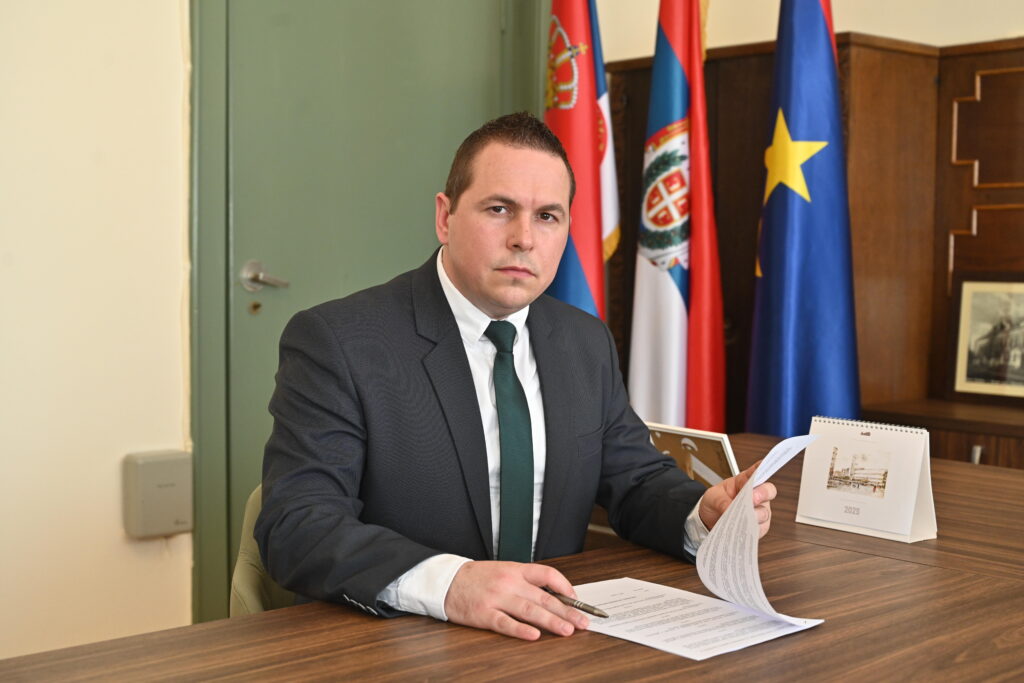How Vojvodina’s institutional model fosters inclusion, rights, and multilingual cooperation in a European context
 Interview by: Robert Čoban
Interview by: Robert Čoban
Robert Otot, Provincial Secretary for Education, Regulations, Administration and National Minorities – National Communities, speaks about the unique role of Vojvodina as a region where multiculturalism is not only respected but actively supported. In this interview, he outlines how education, institutional cooperation, and digital transformation contribute to building a society rooted in inclusion, equality, and respect for diversity, while also reflecting on the challenges and achievements that mark his tenure.
How do you see the role of education today in strengthening multiculturalism and interethnic trust in Vojvodina?
Vojvodina is a region where diversity is not seen as an obstacle, but as a value. In this sense, the education system plays a key role, as it not only transfers knowledge but also shapes future generations – their awareness, attitudes, and relationships with others. Key initiatives include infrastructural investments in schools, digitalisation of teaching, support for education in the languages of national minorities, as well as the promotion of dual education and vocational training. We also place strong emphasis on securing qualified staff and providing continuous support to teachers through professional development programmes and recognition of their work. In the past period, through various calls and projects, we have supported a large number of schools and institutions, thereby creating better conditions for work and learning.
Our policy is focused on ensuring that every child, regardless of ethnic or linguistic background, has an equal opportunity for quality education and development.
What are the key challenges you face in harmonising regulations at the provincial and national levels, particularly regarding the rights of national minorities?
One of the main challenges in aligning regulations at the provincial and national levels concerns the precise interpretation and implementation of laws governing the exercise of national minority rights. The legislative framework is, of course, continually being harmonised, but challenges in its implementation still remain. A particular issue is also the alignment of local regulations and practices with the laws adopted at higher levels of government.
Regarding the rights of national minorities, the legal framework for the official use of minority languages and scripts provides significant opportunities for members of national minorities to freely choose the use of their language in four key areas that are vital for the visibility and preservation of their identity. These areas are: education, culture, information, and the official use of language and script within the territory of the Autonomous Province of Vojvodina.
Additionally, it is essential to establish an effective mechanism for cooperation between provincial and national authorities in order to ensure continuity and harmonisation of all initiatives and legal solutions related to minority protection. This is a challenge that requires constant monitoring and timely responses to improve and fully realise the rights of national minorities in all areas of social life.
Diversity in Vojvodina is not an obstacle, but a value to be nurtured
Your Secretariat covers an exceptionally wide range of areas – how do you balance priorities between education policy, administration, and issues concerning national communities?
Our work is multilayered and requires careful balancing between various competences. We approach it by regularly analysing needs on the ground, monitoring changes in the legislative framework, and consulting with partners – from schools and municipalities to national councils. Priorities are shaped based on strategic goals, but also in accordance with current circumstances – whether it’s about infrastructural investments in educational institutions, administrative reforms, support for teaching in minority languages, or providing conditions for taking professional exams. The key to successful functioning lies in sectoral coordination, mutual understanding, and the rational allocation of resources, because no area operates in isolation – on the contrary, each supports and strengthens the others.
 What is the role of local self-governments in implementing policies from the provincial level, and do you have concrete examples of successful cooperation?
What is the role of local self-governments in implementing policies from the provincial level, and do you have concrete examples of successful cooperation?
Local self-governments are key partners in the implementation of policies originating from the provincial level. Each year, our Secretariat launches calls for proposals in the fields of education and the realisation of national minority rights. One of the key calls in the field of education is the competition for subsidising the transport costs of secondary school pupils. This year, we allocated 151 million dinars for this purpose, with the funds intended for financing and co-financing the transport of secondary school students in intercity traffic. Municipalities provide the remaining funds, ensuring equal access to education for children living in remote areas.
In addition, under the competition for the adaptation and reconstruction of educational institutions, municipalities apply on behalf of preschool institutions, conduct public procurement procedures, and implement the projects. Thanks to an increased budget, the amount of funding awarded under this call has doubled compared to the previous year, with 23 million dinars allocated this year for preschools, enabling more significant investments in improving working and living conditions in kindergartens.
In the area of national minority rights, we also issue calls for funding. Within the competition for allocating budget funds to bodies and organisations operating in the languages and scripts of national minorities in the territory of AP Vojvodina, a total of 10 million dinars was awarded. Among the concrete examples supported this year are:
- Municipality of Bački Petrovac – for the production and installation of signs in national minority languages, 200,000 dinars;
• Serbian National Theatre Novi Sad – for the development of an e-governance system under multilingual conditions, 170,000 dinars;
• Health Centre Kanjiža – for the implementation of a multilingual governance system, 130,000 dinars;
• Provincial Ombudsman – for the development of multilingual services, 200,000 dinars;
• Centre for Social Work of the City of Subotica – for the same purpose, 120,000 dinars.
These projects and calls clearly show how local self-governments are directly involved in implementing provincial policies and how we work together to improve the living and working conditions of all citizens, with a particular focus on realising national minority rights and enhancing educational opportunities.
No area functions in isolation – each supports and strengthens the others
To what extent have digitalisation and public administration reform improved the work of your Secretariat, and what are the next steps?
Digitalisation has significantly contributed to the increased efficiency of the Secretariat’s work. It has enabled us to accelerate procedures, reduce administrative costs, and improve communication both within the institution and with the users of our services. The implementation of electronic systems for applying to public calls, as well as improved inter-institutional connectivity, are just some of the concrete results.
A notable step forward was made with the introduction of the eRegistry, which became operational on 1 January 2024. Thanks to this system, all submissions can now be made electronically, which has led to increased efficiency, transparency, and speed in dealings with the public. Electronic communication has enabled faster processing of requests, better documentation management, and reduced administrative burden for both the Secretariat’s employees and for citizens and businesses.
Public administration reform has further encouraged us to direct resources towards staff training and the modernisation of work processes. The next steps involve further training for employees to work in a digital environment, integration of the eRegistry with other eGovernment systems to automate data exchange, and the introduction of new digital services that will further enhance the quality of the services we provide.
Additionally, plans are in place to introduce, over the coming year, the option for users to apply electronically to the Secretariat’s public calls, which would make the entire process – from submission to decision – fully digitalised. Secretariat staff are already processing applications electronically, but this step represents further progress towards full digitalisation and service accessibility.
Our goal is to expand electronic services, further simplify procedures, and create conditions for even greater transparency, ensuring equal and easy access to information for all citizens, regardless of their place of residence.
When it comes to education in minority languages – do we have enough staff and textbooks? And how are these shortages addressed in practice?
In the areas of preschool, primary and secondary education, the Provincial Secretariat for Education, Regulations, Administration and National Minorities – National Communities strives, through its instruments of support, to contribute to the quality of education in the languages of national minorities.
Specifically, through public calls, we fund various forms of professional development for teaching staff, including training sessions for teachers working in minority languages, in cooperation with educational institutions and national minority councils.
As for textbooks, the Secretariat issues approvals for publishing textbooks in minority languages – an area where we work closely with national minority councils, as well as with the Institute for the Improvement of Education and Training and publishers. Over the past three years, we have issued a total of 65 approvals – 32 in 2023, 30 in 2024, and 3 so far in 2025.
The process of textbook selection in schools is clearly defined – schools choose textbooks from the catalogue of approved editions, and the selection takes place in several stages: from teachers’ councils, through school pedagogical collegiums and school principals, to final approval by the teachers’ assembly and informing the parents’ council and student parliament. Textbooks in minority languages are entered into the catalogue based on a decision of the Provincial Secretariat, in accordance with regulations and the expert opinion of the Pedagogical Institute of Vojvodina.
In this way, we aim to preserve linguistic diversity and enhance the quality of teaching in minority languages in Vojvodina.
Our goal is to ensure equal access to quality education for every child, regardless of background
How do you see the future of Vojvodina as a space of educational, cultural, and institutional diversity in a broader European context?
Vojvodina has always been a place that connects people, languages, and cultures. This diversity is not only a historical fact, but also an active value that must be preserved and nurtured. Our educational, cultural, and administrative policies are aimed at strengthening these identities – not in isolation, but through dialogue and cooperation. In the context of European integration, Vojvodina has the potential to become a model of functional multiculturalism, where rights are not seen as privileges but as an essential part of a democratic society. I am confident that Vojvodina will continue to serve as an example of how institutional support for diversity can be successfully integrated into the broader European framework without losing its own identity.
On a more personal level – what motivates you to deal with such complex and delicate issues, and is there a moment in your career that particularly stands out as confirmation that you’re on the right path?
This role carries great responsibility, but also a strong sense of purpose. Leading the Secretariat requires daily decision-making that affects a wide range of people and topics. What means the most to me are the moments when we receive confirmation from citizens, colleagues within the system, or representatives of communities that we have solved a concrete problem, simplified a procedure, or contributed to a visible improvement. These situations are, for me, the clearest proof that the effort is worthwhile and that we are on the right track.